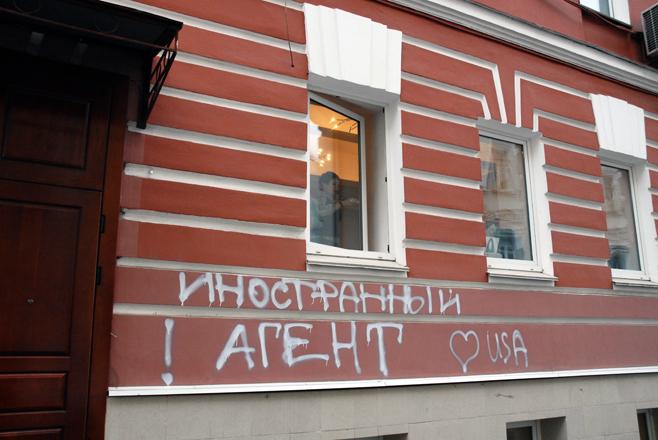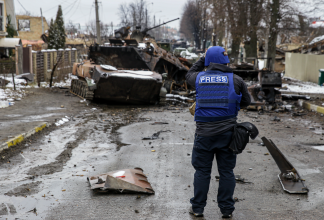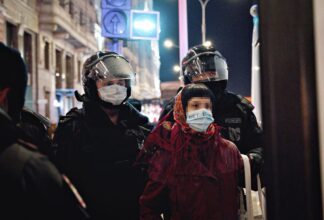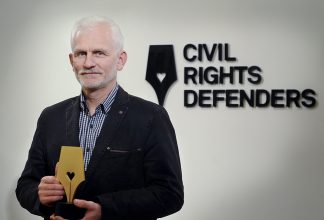Russian Authorities Move to Shut Down a Human Rights Giant

Photo: 2012 Yulia Klimova/Memorial
Russian authorities’ move to shut down Memorial, one of Russia’s oldest and most prominent civil society organizations standing up for human rights, working to commemorate victims of Soviet repression, and providing a platform for free debate and artistic expression, is an outrageous strike into the very heart of Russia’s human rights community.
Read Memorial’s own statement in English here.
Memorial has two key entities: Memorial Human Rights Center and International Memorial Society. On November 11, International Memorial Society received a letter from Russia’s Supreme Court informing them that on November 8 the Prosecutor General’s Office had filed a lawsuit seeking their liquidation over repeated violations of Russia’s “foreign agents” legislation. The court hearing is set for November 25.
In its lawsuit, the Prosecutor General’s Office alleged that International Memorial was “committing a flagrant violation of citizens’ rights” as it “systematically concealed information about carrying out a foreign agent’s function”. To substantiate the accusation, the Prosecutor General’s Office referred to a sequence of administrative fines imposed on the organization and its leadership in late 2019 -2020 for failure to mark some published materials with the toxic and stigmatising “foreign agent” label, one of the pernicious requirements of the “foreign agents” law. The Prosecutor General’s Office then made a Kafkaesque claim that non-compliance with this requirement resulted in violations of the right to freedom of expression and the rights of the child enshrined in the Russian Constitution, the Universal Declaration of Human Rights, the International Covenant on Civil and Political Rights, the International Convention on the Rights of the Child, and the European Convention on Human Rights.
On November 12, Memorial Human Rights Center received information from the Moscow City Court that the Moscow City Prosecutor’s Office filed a similar suit against them and a court hearing was pending.
Civil society organizations play an essential role in the promotion and protection of human rights as they are a tool enabling individuals to work towards the elimination of human rights violations and to hold those responsible to account. The UN Declaration on human rights defenders outlines particularly the rights of individuals to form, join and participate in civil society organizations, associations or groups to promote or defend human rights, a key component of the right to association. It also articulates the importance that civil society organizations are able to freely exercise the rights to association and expression, including through activities such as seeking, obtaining and disseminating ideas and information; advocating for human rights; accessing and communicating with international human rights bodies; and submitting proposals for policy and legislative reform at the local, national and international levels.
Any restrictions imposed on the right to association must be provided by law, and be necessary and proportionate to a legitimate aim. In particular, the Joint Guidelines on Freedom of Association adopted by the OSCE/ODHIR and the Council of Europe Venice Commission state that any sanctions on civil society organizations “must always be consistent with the principle of proportionality.” Moreover, it is recommended that “authorities must take care to apply the measure that is the least disruptive and destructive to the right to freedom of association”. Furthermore, as established by the European Court of Human Rights in its case-law and supported by the Venice Commission of the Council of Europe in its Opinions, the involuntary dissolution of an NGO should only be used as an extreme measure which could only be resorted to in exceptional circumstances, basing on a well-founded rationale.
Importantly, the application of any sanctions against NGOs must be based on well-founded grounds and in relation to genuine infringements. Neither is the case here.
For nearly a decade, Russian authorities have used the repressive legislation on “foreign agents” introduced specifically to arbitrarily restrict the space for civil society organizations and penalize critics, including human rights groups. The move to shut down Memorial, one of Russia’s human rights giants, marks a new Rubicon crossed in the government’s campaign to stifle independent voices.
This attack on Memorial is a political act of retaliation against human rights defenders. Russian authorities should withdraw the suits against Memorial Human Rights Center and International Memorial Society immediately and move to repeal the legislation on “foreign agents” as it directly contravenes the right to association. The authorities should further bring all regulations on the right to association in line with international human rights law and standards and put an end to the crackdown on independent groups and activists.
Undersigned Organisations
Amnesty International
Civic Assistance Committee (designated a “foreign agent” by Russia’s Justice Ministry)
Civil Rights Defenders
Committee Against Torture
Conflict Analysis and Prevention Center
EU-Russia Civil Society Forum’s Board
European Human Rights Advocacy Centre (EHRAC)
Front Line Defenders
Human Rights Watch
International Federation for Human Rights (FIDH)
Norwegian Helsinki Committee


